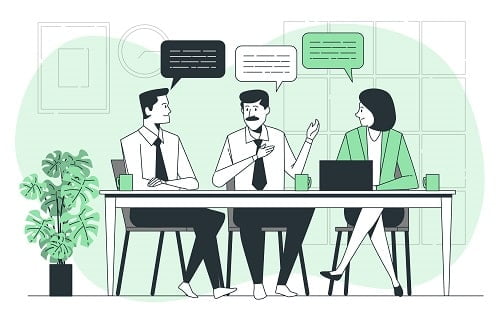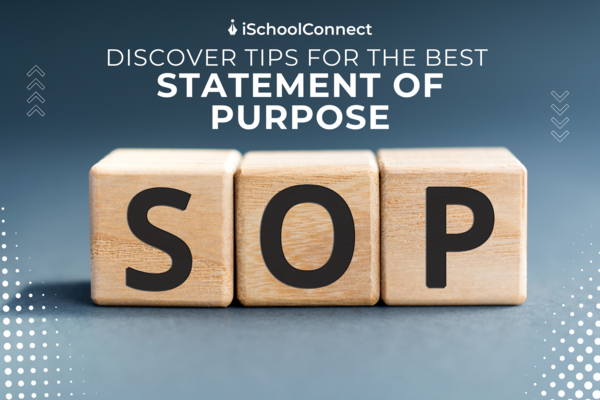Table of Contents
A group discussion is conducted by the college or a hiring company to filter applicants based on their abilities.
If you are preparing for a group discussion for university admissions or a job, then this article can help you understand how to nail it. So, take some cues to improve your group discussion skills now.
What is Group Discussion?

A group discussion involves a certain number of people discussing their ideas on a topic or a set of topics. The topics are generally based on the course or job position you apply for.
It involves a verbal presentation given by the participants discussing the assigned topic or a situation. The presentation is followed by a discussion of the thoughts and viewpoints of the different participants. The participants do not necessarily have to agree with each other, but rather convince their peers why their point is valid.
Importance of group discussion
Group discussion is an integral part of the selection process of a university or a job. But why is it so important? Well, it is a great way for colleges or employers to analyze an applicant.
Students with clarity of thought or knowledge about a topic have the potential to shine more in this round. However, the interviewers assess not only the knowledge but also various other skills. The purpose of a group discussion is to assess communication skills, teamwork, confidence, problem-solving skills, etc.
Therefore, it is an important part of the interview process for college admission or a job position. Especially during college admissions, the communications in this round can help the admission officer understand if you will be the right fit for the university.
Types of group discussion

Now that you know the importance of group discussion, the next step is to learn about the types of group discussions. While the basis of this round always centers around discussing a particular topic, it can be further based on the following:
1. Topic-based
This type of group discussion assesses the knowledge of the participants on a particular topic. Group discussion topics for students may include current affairs, controversial topics, abstract topics, and specific study-related topics. Therefore, you need to present an understanding and your personal views on the topic.
2. Case study-based
This format includes discussing a particular case study. You need to understand the case, discuss details of the case study, and express your views on it. Case study discussions are helpful to analyze your problem-solving abilities, decision-making skills, and presence of mind.
How does a group discussion happen?
Let us walk you through the process of how a group discussion takes place:
- First, it consists of a group of candidates and one or more moderators.
- Then, the topic for is presented along with the rules for the round.
- Each participant is given some time for presenting the initial statements and ideas.
- Once every participant has spoken, the discussion forum is opened to all participants. Each participant has to present his/her ideas and arguments, along with logical and factual explanations.
- Each participant is assessed based on their ideas, presentation, body language, and more such traits.
Some insider tips!

If you need some help to ace this round, then these group discussion tips will be your savior. Keep reading!
1. Read some topics
How about preparing beforehand? You can practice some topics related to the subject for which you are applying. If you are applying for a job, then prepare the topics related to your job position and company profile. The authorities prefer candidates who have a clear understanding of a topic.
2. Focus on your soft skills
Soft skills include your communication skills, listening skills, etc. A major part of these discussions is about how you present yourself and keep conduct among your peers. It can make a huge difference in your performance and selection.
3. Remain positive
During a group discussion, some peers will try to negate your points or overtake your opinions. But, you need to stay confident and stick to your argument points. Remember to stay positive about your approach and do not diverge from the topic of discussion.
4. Stay polite
Being loud and aggressive is a sure-shot way of not getting selected. Moderators look for applicants who are polite and present their views in a calm and collected manner. Therefore, do not lose your calm in a group discussion.
5. Analyze the topic
Try not to jump the gun in a conversation unless you are confident about what you want to talk about. So, analyze the topic of the discussion properly and prepare points and arguments in your mind. It will help you speak confidently when your turn comes.
6. Avoid misinformation
Since you are judged on your knowledge of a topic, avoid speaking about something you are not sure about. Spreading wrong information is worse than not speaking about something at all. Therefore, take a step back if you find yourself in a situation where you do not know much about the topic. Besides this, you can listen to other candidates, gather your thoughts, and then express your views.
Key takeaways
- A group discussion is a screening process where a college or job interviewer assesses how you conduct yourself.
- Make sure you refine your skills, including communication, presentation, and listening skills.
- Assess the topic before making your point.
- Always stay calm and collected during the process.
- Remember to be polite when making your points and do not engage in heated arguments.
- Read on your area of studies or work application to prepare for the discussion.
So, follow all the above-mentioned tips, and you will surely clear the group discussion round. Do you think we should add something more about group discussion? Let us know by reaching out to us.
All the best!
FAQs
Q1. Are group discussions an important part of an interview?
Answer- Yes. It is an important part of an interview since it helps the interviewer analyze candidates based on their knowledge, communication, and problem-solving capabilities.
Q2. Can group discussions help students?
Answer- Yes, group discussions can help students gain confidence, enhance communication skills, and learn to present themselves among their peers professionally. It cultivates decision-making and problem-solving skills among students.
Q3. How can one lead a group discussion?
Answer- To lead a group discussion, it is important to know about the topic being discussed. If a person is confident about the topic, then he/she can steer the conversation and take it forward by providing arguments and opinions.
Q4. Can group discussions happen online too?
Answer- Yes, an online group discussion can take place if the situation does not permit candidates to sit together for a discussion.






